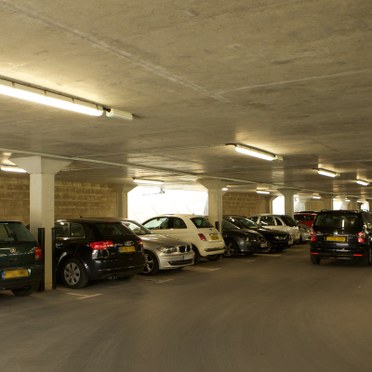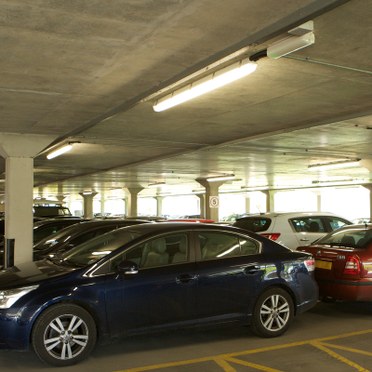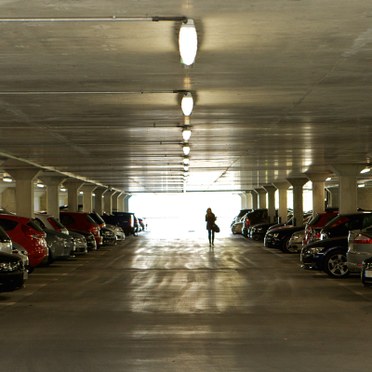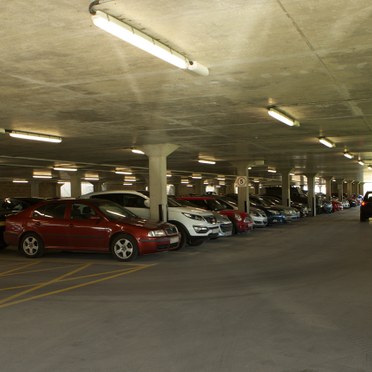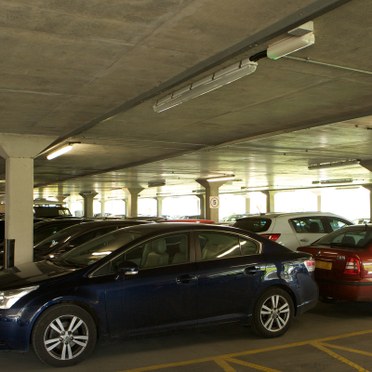White Rose Office Centre Car Park, UK
- Lamp efficacy
Lamp efficacy
Ensuring the lamp efficiently converts electricity into light (lm/W).
- Ballast classification
Ballast classification
Controlling the electricity supply to the lamp (Energy Efficiency Index).
- Luminaire distribution
Luminaire distribution
Improved luminaire distribution resulting in great vertical illuminance.
- System efficacy
System efficacy
Improved luminaire efficacy resulting in significant energy reduction.
- Presence/absence detection
Presence/absence detection
Automatic switching of half the luminaires on presence detection further reduces energy usage.
- Daylight detection
Daylight detection
Reducing waste light during daylight hours.
- Constant illuminance
Constant illuminance
Producing the correct lighting levels for the duration of the maintenance period.
- Task-scene setting
Task-scene setting
Allowing the user to set scenes and adapt the lighting to different tasks.
- Timed off
Timed off
Automatic cut-off to turn all lights off during unoccupied hours.
- Task lighting
Task lighting
Lighting task areas with the correct amount of light.
- Zoning of lighting
Zoning of lighting
Zoning lighting in accordance to occupancy patterns or window location.
- Maintenance schedule
Maintenance schedule
Improved luminaire lifetime of 50,000hrs resulting in reduced maintenance costs.
- Waste light
Waste light
Eliminating waste light which does not hit the intended target.
- Reflectance
Reflectance
Taking advantage of light which is reflected from the surface within the space.
- Visible smart metering
Visible smart metering
Enabling results of actions to be quickly seen as increased or decreased energy use to encourage responsible energy consumption.
Migration to LED lighting reduces energy consumption by 60% and lowers maintenance costs
The White Rose Office Centre Car Park has a long-standing relationship with GMI Energy, after GMI Construction originally built its state-of-the-art offices. The GMI Group is at the forefront of sustainable development in the UK, leading the way with smart building technology and environmental intelligence. It continually strives to add value to clients, so allowing GMI Energy to assess the potential for improved energy management in the car park was a natural progression and the first major step towards improved energy efficiency. With the support of the Thorn Energy Solutions team, GMI Energy managed this project from start to finish with an in-house team of energy experts.
The challenge
The car park used a very inefficient fluorescent lighting system with a lifespan of typically just one year. Many of the lights were continually failing at a huge expense. There were also no lighting controls included with the previous lighting which means that all luminaires are on at 100% all day everyday regardless of whether anyone is in the carpark.
The target for the project was to reduce energy consumption whilst also reducing maintenance costs, and to deliver better light quality with improved safety.
The Solution
GMI Energy has provided a new LED lighting system for the car park, replacing the fluorescent lighting with vastly improved energy efficiency. The new lighting system, which comprises 200 ImpactForce II LED luminaires (36W), will reduce energy consumption by 60 per cent and consequently deliver significant financial and CO2 savings. With a 50,000-hour lifetime, the new LED lights can be expected to last more than 6 years and therefore drastically reduce maintenance requirements and costs. Overall, the system will pay for itself in just 1.9 years.
Another main driver for the project was to improve the lit environment within the car park area. Some luminaires in the carpark had failed leaving pockets of darkness which made the carpark feel unsafe at night. By using the very latest LED technology this has been achieved by producing a crisp white light with excellent vertical illuminance. The light distribution of the ImpactForce II LED luminaire ensures light onto the vertical surfaces of cars within the space and not just onto the ground. This makes the area feel bright and consequently a great deal safer. Further energy savings have been achieved by using presence detectors to switch off half the luminaires when nobody is present.
Key Facts
- Energy saving: 60%
- CO2 saving per annum: 95 tonnes
- Payback: 1.9 years

